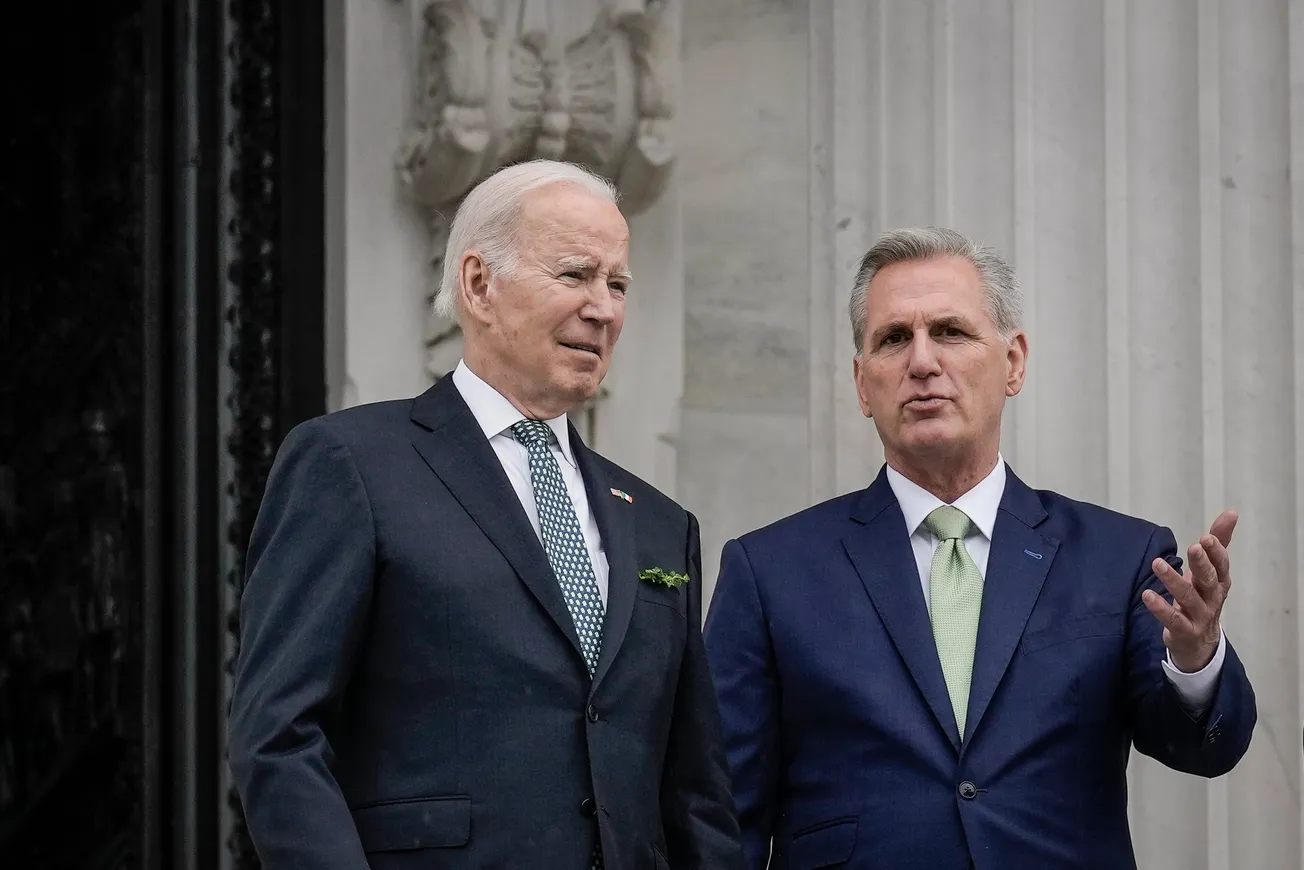For all the drama of the last two weeks - multiple meetings of Congressional leaders at the White House still employing Covid protocols, President Biden cutting short his Asia-Pacific visit and not attending the forth Quad meeting, and Speaker McCarthy's daily updates about progress - the recently announced budget deal is an insult to the American people.
To understand why, let us examine the three different budget proposals floating around Washington since March.
1. The Biden Budget
On March 9, President Biden fired the first salvo in releasing his budget.
America's debt stands today at a whopping $31 trillion, but for Fiscal 2023, President Biden wanted to spend $6.8 trillion, about $530 billion more than Fiscal 2022, although Covid is long behind us. His defense spending was the biggest in history, at $886 billion, compared to $767 billion last year. If Congress blessed Biden's budget request as he proposed it, the federal deficit would reach nearly $2 trillion. Yes, an annual deficit of $2 trillion.
As is typical with the Biden White House, the official statement was full of lies, and the media lapped them all up without questioning the assertions. The narrative was that Biden was reducing the deficit when it was actually increasing at an alarming rate. The idea that costs were being lowered for families was false because Bidenflation, running at 15.3% in April, has continued to take a bite out of American households.
2. The GOP House Budget
Speaker Kevin McCarthy, who won the gavel after 15 grueling House votes in January, criticized the Biden budget. In April, he corralled a weak coalition (the GOP has a 222-213 majority meaning McCarthy could not afford a defection of more than five votes) to pass a House response to the budget. This budget was so unserious that we noted last month that it was a joke on the American people. McCarthy blessed 78% of the Biden budget as is and never questioned the defense budget, merrily agreeing to fund the Ukraine war.
The GOP budget targeted just the 22% of the budget set aside for discretionary spending. McCarthy's idea was to start with the 2022 baseline and increase it by 1% a year, rather than the inflation-adjusted 3.25%. He ignored the fact that America would still have a $1.375 trillion deficit in 2023. Because debt service costs are significantly higher as the Fed continues to increase interest rates, and both parties in Washington want to continue to fund Ukraine, the deficits would actually be worse in subsequent years.
For the ten-year period of 2023-2032, the Congressional Budget Office (CBO) estimated that the Biden budget would result in an additional $18.8 trillion in deficits, bringing America to nearly $50 trillion in total debt by 2032. McCarthy's budget lowered this by about $4.6 trillion, but would still leave America with $45 trillion in debt in 2032. In McCarthy's Beltway-trained thinking, an increase of 1% counted as a cut because the debt would be less than the Biden numbers.
Debt ceiling lever. With the Senate in Democratic control, even this watered-down GOP budget had little chance of passing Congress. Even if it passed, the legislation risked a presidential veto. But McCarthy had one tool to use as a lever to get free-spending Democrats to negotiate. America's rapid borrowing had again brought it close to the debt ceiling, and unless Congress raised it, the Treasury would run out of money to pay the government's bills. Janet Yellen, the Treasury secretary, said that this day would occur on June 1, later modified to June 5.
The McCarthy-Biden budget. After weeks of drama, the two leaders agreed on a 99-page budget outline, which was supposed to be a compromise.
The agreement, as we said earlier, is an insult to Americans. McCarthy caved to Biden by agreeing to unconditionally raise the debt ceiling to whatever amount is needed by the Treasury and not address the issue until January 2025, after the 2024 general election. Regarding "savings," the White House estimates that the deal would cut spending by $1 trillion over a decade because discretionary spending would not increase as fast as the other budget elements. In other words, America would still have a total debt burden of $49 trillion in 2032, not the $50 trillion under the original Biden plan or the $45 trillion under the original McCarthy budget. Every practical demand went the Democrats' way.
Congress Should Vote Down The McCarthy-Biden Deal
The Left is furious that the White House agreed to even $1 trillion in savings over the next ten years. So, expect many left-leaning lawmakers to vote no on the agreement.
The rank and file of the GOP should vote down the deal even at the risk of the nation defaulting on the debt ceiling. The only terms acceptable to the GOP should be:
- Agree to raise the debt ceiling for four months in return for appointing a bipartisan commission, like Simpson-Bowles, that would examine every aspect of the federal budget, including taxes and defense spending with its far-flung bases worldwide, and report back to Congress by next summer. Entitlement reform, such as changes to Social Security, should be an integral element.
- Once the commission is formed and constituted, Speaker McCarthy should raise the debt ceiling through the early Fall of next year, right in the middle of the election season, so that Americans have a say at the ballot box.
- Before the 2024 election, McCarthy should force votes on the House floor and raise the ceiling to the first 100 days of the next presidential administration so the country can come together to pass a ten-year deficit reduction bill into law.
Washington should restore America's global standing by fundamentally changing how the government spends more than it takes in revenue. Congress should vote down anything less. No questions asked.
Like our insights? Show your support by becoming a paid subscriber!









